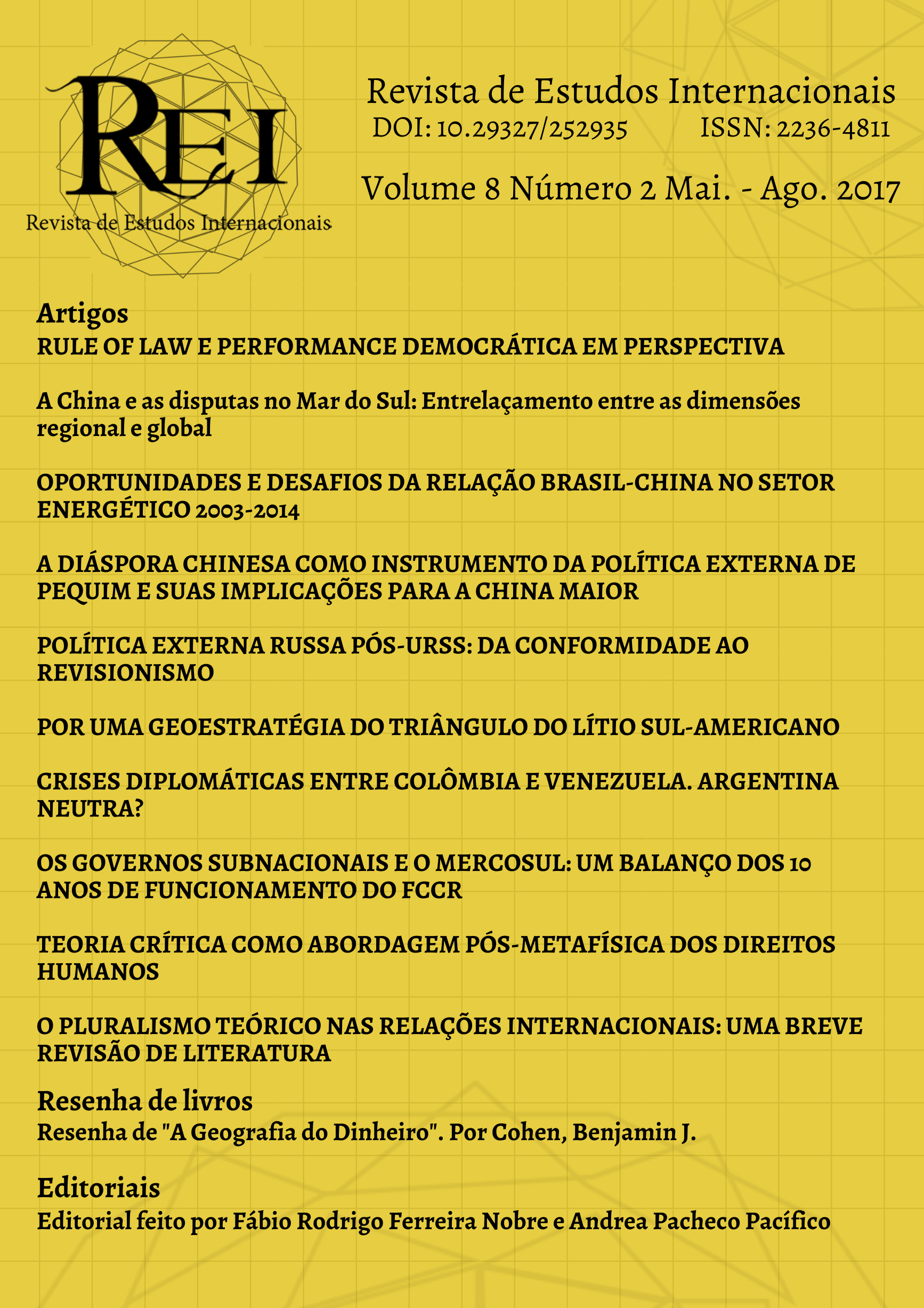RULE OF LAW E PERFORMANCE DEMOCRÁTICA EM PERSPECTIVA
Palavras-chave:
Checks and Balances, Judicialização da política, Performance democráticaResumo
O debate sobre constitucionalismo vem ocorrendo por meio da compreensão sobre em quais condições as escolhas institucionais delimitam o design constitucional adotado por um determinado país. A instituição da Constituição nacional ocupa papel central nesta discussão, tendo em vista que esta é a lei feita para durar, funcionando como mecanismo de checks and balances. O presente artigo aborda esta temática por meio de um review teórico da literatura, promovendo um debate entre a judicialização da política e a teoria democrática contemporânea.
Referências
BAIRD, Vanessa A.; JAVELINE, Debra (2010). The Effects of National and Local Funding on
Judicial Performance Perceptions of Russia's Lawyers. Law & Society Review, 44 (2): 331-64.
BIGLAISER, Glen; STAATS, Joseph L. (2012), Finding the "Democratic Advantage" in Sovereign
Bond Ratings: The Importance of Strong Courts, Property Rights Protection, and the Rule of Law.
International Organization, 66 (3): 515-35.
CAMERON, Charles (2002). Judicial independence: how can you tell it when you see it? And who
cares? In BURBANK, S e FRIEDMAN, B (eds). Judicial independence at the crossrroads: an
interdisciplinary approach. London: Sage, 138-40.
COUTO, Cláudio G. (2005). Constituição, competição e políticas públicas. Lua Nova, 65: 95-135.
DWORKIN, Ronald (2003). A bill of rights for Britain. In DAHL, R. et al. (eds.). The democracy
sourcebook. Cambridge: The MIT Press, 217-20.
ELKINS, Z.; GINSBURG, T.; MELTON, J. (2009). The endurance of constitutions. Cambridge:
Cambridge University Press.
HAGGARD, S. et al. (2007). The Rule of Law and economic development. Annual Review of
Political Science, 11: 205-34.
HARDIN, Russel (1989). Why a constitution? In GROFFMAN e WHITTMAN, D. (eds.). The
federalist papers and the new institutionalism. New York: Agathon Press, 100-120.
HELMKE, Gretchen; ROSENBLUTH, Frances (2009). Regimes and the rule of law: Judicial
Independence in comparative perspective. Annual Review of Political Science, 12: 345-66.
HIRSCHL, Ran (2008). The Judicialization of Mega-Politics and the Rise of Political Courts.
Annual Review of Political Science, 11: 93-118.
LIJPHART, Arend (2003). Modelos de Democracia: Desempenho e padrões de governo em 36
países. Rio de Janeiro: Civilização Brasileira.
MELO, Marcus A. (1998). Constitucionalismo e Ação Racional. Lua Nova, 44: 55-79.
PEREZ-LIÑÁN, Anibal; CASTAGNOLA, Andrea (2009). Presidential control of high courts in
Latin America: A long-term view (1904-2006). Journal of Politics in Latin America, 1 (2): 87-
PERSSON, Torsten; TABELLINI, Guido (2004). Constitutions and economic policy. The Journal
of Economic Perspectives, 18 (1): 75-98.
POZAS-LOYO, Andrea: RÍOS-FIGUEROA, J. (2010). Enacting constitutionalism: The origins of
independent judicial institutions in Latin America. Comparative Politics, 42 (3): 293-11.
SKAANING, Svend-Erik (2010). Measuring the Rule of Law. Political Research Quarterly, 63
(2): 449-60.
WALDRON, Jeremy.(2003). A right-based critique of constitutional rights. In DAHL, R. et al.
(eds.). The democracy sourcebook. Cambridge: The MIT Press, 221-31.
______. (2006). The core of the case against judicial review. Yale Law Journal, 115: 1347- 406.


